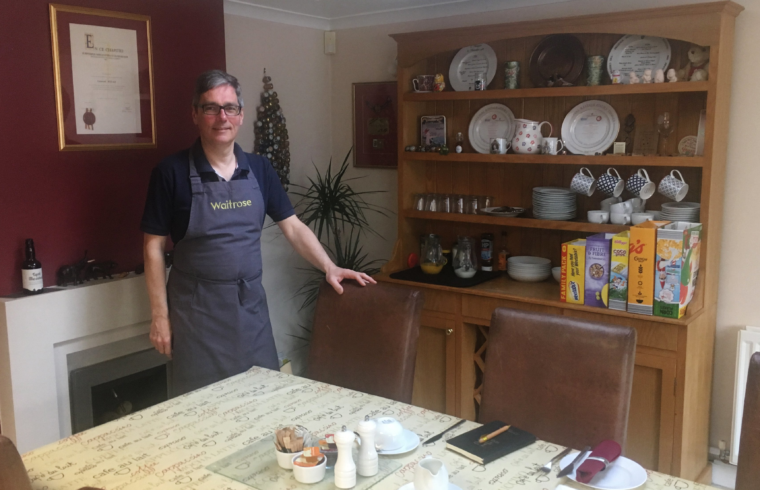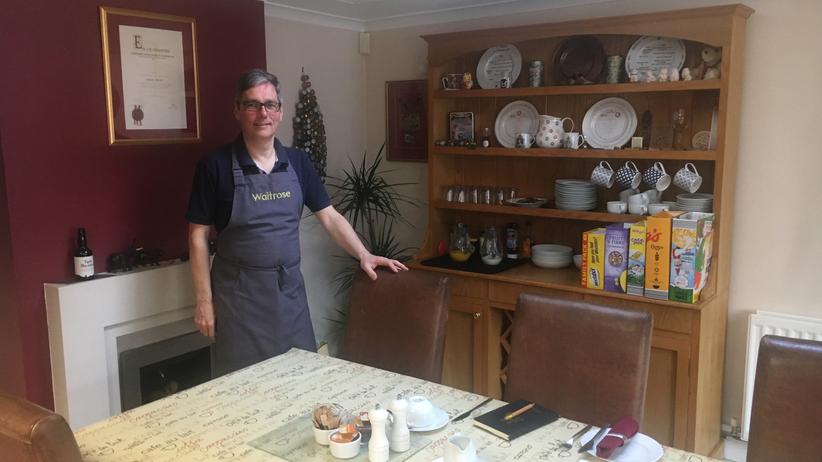This article is part of
our series called “The New Europeans.” Ahead of the European elections,
we are visiting people who don’t dream of Europe, but who live European
lives. The series focuses on moments of joy and conflict that wouldn’t
have happened without the EU.
Lesen Sie diesen Text auf Deutsch
Jane: I was hoping for Brexit when I went to sleep in June 2016.
Richard: I almost decided at the last second for Leave.
Michael: It’s unbelievable what our government is doing here.
Jane: We just want to get out of this.
It is shortly before 8 p.m. in Maidenhead, a town just west of London. Jane, Richard and Michael are sitting at a long, rectangular table as the Indian curry on the stove fills the room with its fragrance. The news of the day is flickering across the screen of the kitchen television mounted on the wall. British Prime Minister Theresa May has again failed on this Monday to convince parliament to vote in favour of her Brexit plan. Jane, Richard and Michael are hungry – and they have consented to take part in a journalistic experiment.
The three Brits, who could most accurately be described as belonging to the upper-middle class, are here to talk about Brexit, despite the fact that they voted differently in the June 23, 2016, referendum. As a condition for their participation, the three asked that neither their family names nor their photos be used for this article.
The comments from Jane, Richard and Michael reflect their views of the situation, no more and no less. They aren’t representative – they are just as direct and politically incorrect as are many of the Brexit discussions that take place every day in the country. The reporter merely sat at the table with a recorder and a notepad and listened in.
Jane: I want to leave, because the EU is not what it was supposed to be. In the beginning, it was all about a common market. But the Commission wants a federal state now. They want to have the United States of Europe like the U.S.A. And this Juncker wants to be the king. The unelected king. So everyone has to do what he wants.
Michael: There is a lot of disinformation out there about the EU.
Jane:Theresa May took on a job, which actually no one else wanted. She has been very brave, but is she the right person for the job? Everybody has had it in for her from day one. And she is a Remainer. Our government is led by a Remainer.
Michael: Hmm.
Richard: All this is so complicated.
Maidenhead has a population of around 70,000 and is located about an hour’s drive west of London in an area that isn’t especially poor. There is a flight school in town, a judo club and a bowls club. The roads don’t have any potholes, and in front of the roundabout in the town centre, there are electronic warning signs reading: “Think bike! Look twice!” The town has been part of Theresa May’s constituency since 1997 and she lives with her husband just a couple of villages away. Jane, Richard and Michael aren’t from the region, but they all work here on a regular basis. Richard is a carpenter while both Jane and Michael work in IT and during the week, all three of them frequently stay in the Bakehouse, a guesthouse in a quiet residential area in Maidenhead. The owner of the guesthouse is a Frenchman named Laurent who says he likes the town for its tranquillity. In the evenings, he cooks for his guests.
Jane: The EU would be fine if everybody was equal. But we in the UK work long hours. We work long hours to make Britain successful. And then you’ve got Greece. When they feel like it, they work. Like the other countries, which have siesta during the day. Instead of working hard, all they have to do is to take their cup and go to the EU. They say: The UK is doing well, can we have more money? The more successful you are as a country, the more money you put into the pot. That’s how it works.
Michael: That’s the same with everything, isn’t it? If you do well in your job, you’re going to pay more tax. I am paying into a tax pot that is for everyone, even strangers, in the whole country.
Jane: But you are paying taxes for you and yours. For you and your family.
It falls quiet at the table and host Laurent asks if anyone wants a piece of carrot cake for dessert. Jane declines. Born in 1962, she has two children and actually lives in a county on the English east coast. During the referendum almost three years ago, she voted in favour of leaving the EU.
Michael is sitting across from Jane. The two know each other, but not all that well. The tech expert was born in 1951 and he is from Cambridge, north of London. He also has two children, with one son working as a journalist and the other as a scientist. Michael believes that leaving the EU would be bad for his sons’ futures and he voted to remain in the EU.
Richard, born in 1971, is the youngest of the three and comes from Leicester, about two hours north of Maidenhead. In June 2016, he voted Leave, but says today he might vote differently.
© Steffen Dobbert für ZEIT ONLINE
Jane: We work like animals and we have to pay taxes – just to help those, who don’t want to work, those who have chosen a lifestyle of taking advantage of our benefits. They like it very much to live off our benefits. And that is exactly what I see some European countries, like Greece and Italy, doing.
That’s what happened with Ireland. Do you know when Ireland joined the EU? I was there. I was in Ireland for two weeks. I was surprised. They were so happy. Because they get millions and millions from the EU. When do we get money?
Michael: Didn’t Ireland come in at the same time as the UK? Or was it later?
Richard: Wasn’t it in the 1970s?
The United Kingdom and the Republic of Ireland joined the European Community in 1973, but British Prime Minister Harold Wilson renegotiated his country’s membership just one year later. The result was that Britain had to pay a lower contribution. Nevertheless, a first referendum on whether the country wanted to remain in the European Community was held on June 5, 1975, with fully 67.2 percent of voters casting their ballots in favour of remaining.
Forty-one years would pass before the next referendum, in June 2016. This time, a narrow majority (51.9 percent) joined Jane and Richard in voting to leave the EU. As a consequence, companies like Sony, Panasonic and Dyson transferred their headquarters out of England and Honda closed down its factory in Swindon. Nissan has likewise turned its back on Britain when it comes to assembling the next generation of its most important models.
But the British political landscape has suffered as well. The country’s two largest parties, Labour and the Conservatives, have both been consumed by infighting. One prime minister, two Brexit ministers and more than a dozen other cabinet members have resigned since the referendum. The Remainers want to stay in the EU despite the referendum and are demanding a new vote. The Leavers, who insist on Brexit being carried out, find such demands infuriating. The British historian Ian Kershaw has said that “Brexit would be the greatest act of national self-harm in postwar history.”
Hits: 0





















